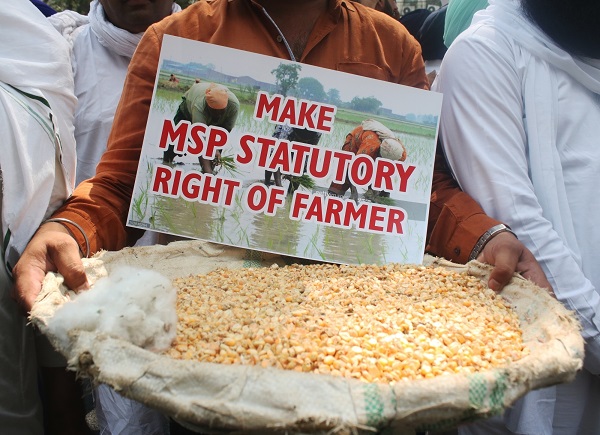New Delhi, (Samajweekly) The Cabinet Committee on Economic Affairs (CCEA) on Wednesday approved increase in the Minimum Support Price (MSP) for all mandated Rabi crops for Rabi Marketing Season (RMS) 2022-23 with an aim to realigning the MSPs in favour of oilseeds, pulses, and coarse cereals over wheat.
This has been done to encourage farmers shift to a larger area for these crops and adopt best technologies and farm practices, to correct demand-supply imbalance, a Cabinet communique said.
The government has increased the MSP of Rabi crops for RMS 2022-23, to ensure remunerative prices to the growers for their produce. The highest absolute increase in MSP over the previous year has been recommended for lentil (masur) and rapeseeds and mustard (Rs 400 per quintal each) followed by gram (Rs 130 per quintal).
In case of safflower, there has been an increase of Rs 114 per quintal, in comparison to last year.
The differential remuneration is aimed at encouraging crop diversification.
For wheat, there has been an increase of Rs 40 per quintal while for barley, it is Rs 35 per quintal, over last year.
The MSP for RMS 2022-23 for wheat has been announced as Rs 2,015 per quintal considering the cost of production for 2022-23 as Rs 1,008, for barley, it is Rs 1,635 against Rs 1,019, MSP for gram has been announced as Rs 5,230 against the cost of production of Rs 3,004, for lentil, it is Rs 5,500 against Rs 3,079, for rapeseed and mustard at Rs 5,050 against Rs 2,523 and the MSP for safflower has been announced as Rs 5,441 against the cost of production of Rs 3,627.
The cost of production as calculated refers to the comprehensive cost which includes all paid out costs such as those incurred on account of hired human labour, bullock labour/machine labour, rent paid for leased in land, expenses incurred on use of material inputs like seeds, fertilisers, manure, irrigation charges, depreciation on implements and farm buildings, interest on working capital, diesel/electricity for operation of pump sets etc, miscellaneous expenses and imputed value of family labour.
The increase in MSP for Rabi Crops for RMS 2022-23 is in line with the Union Budget 2018-19 announcement of fixing the MSPs at a level of at least 1.5 times of the all-India weighted average cost of production, aiming a reasonably fair remuneration for the farmers, the statement said.
“The expected returns to farmers over their cost of production are estimated to be highest in case of wheat and rapeseed & mustard (100 per cent each), followed by lentil (79 per cent), gram (74 per cent), barley (60 per cent) and safflower (50 per cent), it said.
Additionally, the National Mission on Edible Oils-Oil Palm (NMEO-OP), the centrally sponsored scheme recently announced by the government, will help in increasing the domestic production of edible oils and reduce import dependency.
The umbrella scheme “Pradhan Mantri Annadata Aay SanraksHan Abhiyan’ (PM-AASHA), announced by the government in 2018, will aid in providing remunerative return to farmers for their produce. It consists of three sub-schemes i.e. Price Support Scheme (PSS), Price Deficiency Payment Scheme (PDPS) and Private Procurement & Stockiest Scheme (PPSS) on a pilot basis, the release added.










